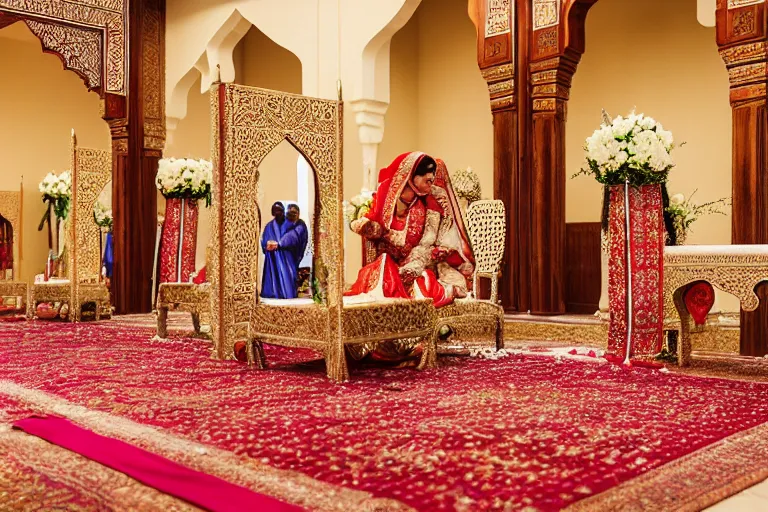Explore the customs, rituals, and traditions of an Islamic wedding in this detailed guide.
Islamic weddings are a beautiful and significant event in the lives of Muslims. This article will delve into the various aspects of an Islamic wedding, providing you with a comprehensive understanding of this joyous occasion.
The Significance of an Islamic Wedding
Imagine the joy of walking down the aisle, hand in hand with your lifelong partner, surrounded by loved ones who celebrate the bond you are about to seal. An Islamic wedding is not just a union; it’s a profound commitment and a celebration of love and faith. But what makes an Islamic wedding so unique? Why do Muslims place such great importance on this ceremony?
Firstly, let’s delve into the religious significance. In Islam, marriage is viewed as a divine institution that sanctifies the relationship between two individuals. It’s more than just a legal contract; it’s a spiritual bond that brings together not only the couple but their families and communities. The Nikah ceremony itself is a testament to this holy union, where both parties express their willingness to marry with words of consent.
The social significance cannot be overstated either. An Islamic wedding often serves as a community event, where traditions are upheld and shared. It’s a time for families to come together, reinforcing the bonds that hold communities strong. The celebration is a mix of joyous festivities, where food, music, and dance bring everyone closer.
Moreover, an Islamic wedding underscores the importance of mutual respect and understanding. Before the ceremony, the couple must ensure they have compatible values, which makes the bond formed during Nikah even stronger. This pre-marriage counseling ensures that both partners are well-prepared for the journey ahead.
So, as you embark on this beautiful journey of love and commitment, remember that every Islamic wedding is a reaffirmation of the covenant between two souls. It’s not just about saying ‘I do,’ but it’s about promising to support each other in all aspects of life. The significance lies in the enduring promise made under the guidance of Shariah, bringing together two lives into one beautiful, harmonious existence.
In essence, an Islamic wedding is more than just a ceremony; it’s a celebration of love and faith that strengthens families and communities. It’s a testament to the beauty of commitment in every form, reminding us all of the joy and responsibility that comes with loving and being loved in this world.
Preparing for the Big Day: The Nikah Contract
Preparing for the big day involves many aspects, but perhaps none is as crucial and solemn as understanding and preparing for the Nikah contract. Think of it as a legal document that binds two souls in matrimony, rooted deeply in Islamic law. How can we possibly overlook its significance? The Nikah contract serves not just as a binding agreement, but also as a declaration of commitment and mutual respect.
The process begins with the Qubulat al-Nikah, or acceptance, where both parties agree to the terms and conditions. This is where the couple’s intentions are clearly stated, ensuring that there’s no miscommunication down the line. But what exactly does this entail? The contract typically includes details such as the bride’s dowry (mahr), which can be in the form of money or tangible assets, meant to ensure the financial security and independence of the wife.
Witnesses play a vital role in confirming the agreement’s validity. Imagine these witnesses as anchors, holding both parties accountable to their promises. Without them, the contract lacks credibility and legal standing. The importance of having two adult male Muslim witnesses cannot be understated; they serve not only as witnesses but also as advisors or mentors who can guide the couple during their journey together.
The requirements for a valid Nikah include both parties’ consent, the agreement on financial terms, and the presence of at least one witness. It’s crucial to ensure that all these elements are present and understood thoroughly. Failure to meet any of these can invalidate the contract, leading to legal complications later on.
As you prepare for your Nikah ceremony, consider it a step towards building a strong, God-centric relationship. It’s more than just signing a piece of paper; it’s about pledging yourself to another in front of witnesses and under the scrutiny of divine law. The Nikah contract is not only a legal binding but also a spiritual commitment that strengthens your bond with both each other and Allah.
Understanding the Nikah contract thoroughly can alleviate many worries and provide clarity, ensuring that your special day is nothing short of a blissful celebration rooted in faith and tradition. After all, isn’t every step towards a lifelong partnership a precious journey?
The Wedding Ceremony: A Blend of Tradition and Spirituality
Imagine standing under the verdant boughs of a lush garden, surrounded by your loved ones as the call to prayer echoes through the air. The wedding ceremony in Islam is not merely an exchange of vows; it is a blend of tradition and spirituality that encapsulates the essence of unity and commitment.
The recitation of verses from the Quran during the ceremony holds profound significance. Imagine the holy words of Allah, ‘Inna azwajakum illa mulkun ilainaa wa azzarnaa inna ‘ilayka raja’an’ (Your wives are like tilth for you; so cultivate them as Allah has cultivated you)’, resonating through the air. These verses remind the couple of their roles and responsibilities, serving as a powerful reminder of the divine guidance that governs marital life.
The exchange of rings is another ritual that carries deep symbolism. The ring, often adorned with intricate designs, represents the binding of two hearts in eternal love. As the betrothed places the ring on each other’s finger, it signifies their commitment to support and protect one another through life’s joys and challenges.
Prayer is an integral part of the ceremony, reflecting the spiritual essence of Islam. The couple stands before Allah, asking for His blessings and guidance in their union. This act of dua (supplication) serves as a powerful affirmation of faith and devotion, ensuring that their marriage is not just a human institution but also a sacred bond under the watchful eye of God.
The ceremony concludes with a heartfelt Nikkahnama, the document that formalizes the union. As witnesses sign it, they attest to the couple’s commitment and ensure the sanctity of their marriage according to Islamic law. This moment is not just about legal binding; it’s a celebration of love, respect, and mutual agreement.
As the ceremony draws to a close, the couple steps out into the verdant boughs, ready to face life’s challenges together. The wedding ceremony in Islam is more than a formal ritual—it is a testament to their shared values and aspirations for a happy and fulfilling life.
How can such an intricate blend of tradition and spirituality fail to inspire and unite a couple? The Islamic wedding ceremony, with its rich traditions and deep spiritual significance, sets the stage for a lifelong journey of love, respect, and faith. It’s more than just a celebration; it’s a commitment that honors both the couple and their community.
The Wedding Reception: A Celebration of Love
The wedding reception, often referred to as walimah, marks the next significant milestone in an Islamic marriage. It’s not just a party; it’s a celebration that underscores the union and sets the stage for shared life journeys. Imagine this gathering as a vibrant tapestry, woven with threads of joy, love, and commitment.
At the heart of any walimah is the idea of hospitality. The hostess or host, typically the groom’s family, extends an open invitation to relatives, friends, and even neighbors. This act of opening one’s home echoes the Islamic principle of khulafa ar-rahman, meaning ‘caliphs of God’s mercy.’ By inviting people into their lives, families extend a hand of welcome, symbolizing acceptance and unity.
The festivities are filled with music, dance, and delicious food. Think of it as the crescendo to a symphony, where each element—be it a traditional song or an elegant dish—adds its unique note. The qawwali, a form of devotional Sufi music, can transport you to a spiritual realm, while rhythmic dances like the tashreeq bring joy and unity among guests.
Music and dance are more than just entertainment; they serve as a bridge between the earthly celebration and the divine. They remind us that happiness is a gift to be shared, much like sharing food during the feast. The vibrant colors of traditional outfits and the laughter that echoes through the hall create an atmosphere where everyone feels welcome, making every guest feel like family.
The walimah also highlights the importance of community support. Guests bring gifts, not just for the couple but as a token of their blessings and well-wishes. This gesture of giving is rooted in the Islamic concept of sadaqat, or voluntary charity. It signifies that this event is about more than personal joy; it’s about spreading happiness and support among community members.
In essence, the walimah is a celebration that encompasses every aspect of human emotion—from love to joy to gratitude. It is a perfect blend of tradition and spirituality, where each element intertwines beautifully to form a memorable event that honors the couple and strengthens social bonds. As the night progresses, one can’t help but feel that this gathering is more than just a party; it’s a testament to the enduring beauty of human connection.
The Role of Family and Community in an Islamic Wedding
Imagine the bustling streets of Marrakech, where every corner whispers tales of love and tradition. In such a vibrant setting, one can see how deeply intertwined family and community are in an Islamic wedding. The bride’s and groom’s families play pivotal roles, much like the intricate knots that bind threads together to form a beautiful tapestry.
Consider the responsibilities of the bride’s family: they not only prepare her for marriage but also ensure she feels loved and supported throughout this significant transition. It’s as if they are weaving a path for their daughter, carefully choosing each thread to make sure it fits seamlessly into the larger fabric of her life. On the other side, the groom’s family is equally involved, offering guidance and support to the young man as he embarks on his new journey.
But the role of community cannot be underestimated. Think of a grand event where everyone comes together like pieces in a puzzle, each part contributing to the whole. Community support ensures that no one feels left out or unloved during this joyous occasion. Friends and neighbors gather to share their blessings, their laughter, and their presence, creating an atmosphere of warmth and unity.
Moreover, the community plays a crucial role in maintaining traditions and customs. It’s like keeping alive an ancient melody that resonates through generations, ensuring that the spirit of Islamic weddings remains vibrant and meaningful. Every dish served, every dance performed, and every prayer recited is a testament to this rich cultural heritage.
So, as you immerse yourself in the vibrant world of Islamic weddings, remember the intricate interplay between family, community, and tradition. It’s a tapestry that, when pulled together, forms a beautiful celebration of love and commitment. Each thread, each stitch, tells a story—a story of unity, support, and the profound joy of coming together to celebrate one of life’s greatest moments.
Islamic Weddings Across the World: A Diverse Landscape
Islamic weddings are as diverse as the lands they take place in, each region weaving its own rich tapestry of customs and traditions. From the bustling bazaars of Istanbul to the tranquil villages of Morocco, these ceremonies reflect not only Islamic principles but also the unique cultural identities of their communities.
Have you ever wondered how an Egyptian wedding differs from a Turkish one? In Egypt, for instance, the aqida ceremony is a pivotal moment where the couple exchanges rings in front of witnesses. This practice symbolizes the binding nature of marriage and is often accompanied by vibrant decor and lively music, creating a joyful atmosphere that can last for days. Conversely, in Turkey, the nikah ceremony is more subdued but just as meaningful, focusing on spiritual blessings and community involvement.
In Indonesia, where Islam is the predominant religion, local traditions blend seamlessly with Islamic practices. The nikah mutawassitah (community-based marriage) is a common practice here, emphasizing communal support in the process of matrimony. Imagine sitting in a grand hall adorned with flowers and traditional decorations, as friends and family gather to witness the couple’s commitment. Each region adds its unique flavor, whether it’s the wedding feast in Pakistan or the johor ceremony in Malaysia.
The variations are endless, from the intricate henna designs in North Africa to the elaborate decorations found in Central Asia. But despite these differences, a common thread runs through them all: the deep-rooted importance of family and community support. These customs not only enrich the personal journey but also strengthen the bonds within communities, making each wedding a vibrant celebration of ummah, or the Islamic community.
Each wedding is like a chapter in a story, unique yet interconnected, reflecting the rich diversity of Islamic cultures across the world. Whether it’s a simple gathering or a grand event, these ceremonies are more than just celebrations; they are profound expressions of love, faith, and unity.
Conclusion
 By the end of this guide, you will have gained valuable insights into the customs, rituals, and traditions that make an Islamic wedding unique and meaningful. May this knowledge enrich your appreciation for this beautiful event.
By the end of this guide, you will have gained valuable insights into the customs, rituals, and traditions that make an Islamic wedding unique and meaningful. May this knowledge enrich your appreciation for this beautiful event.











